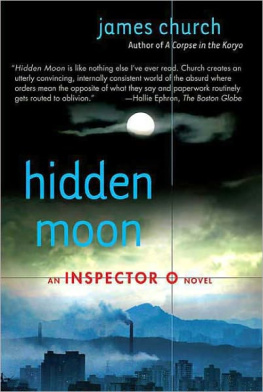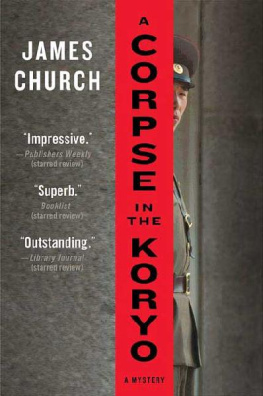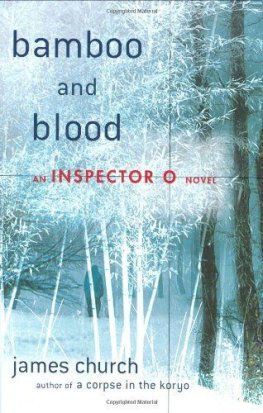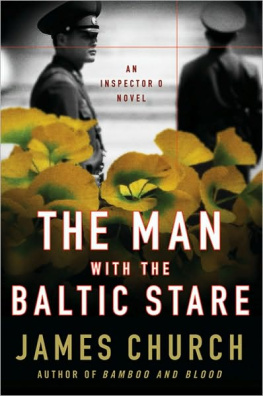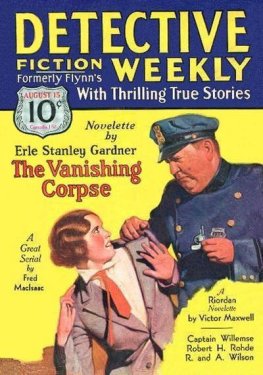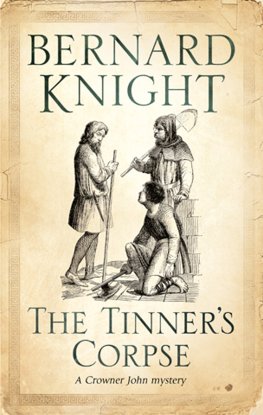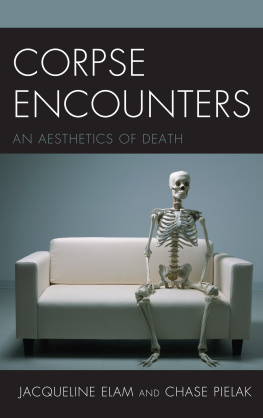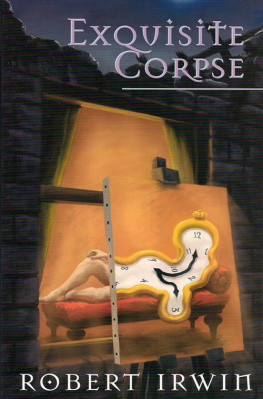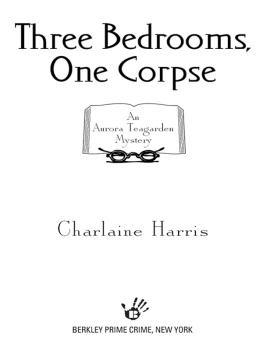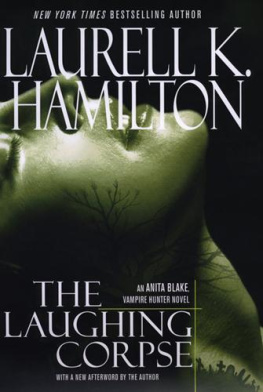James Church - A Corpse in the Koryo
Here you can read online James Church - A Corpse in the Koryo full text of the book (entire story) in english for free. Download pdf and epub, get meaning, cover and reviews about this ebook. genre: Detective and thriller. Description of the work, (preface) as well as reviews are available. Best literature library LitArk.com created for fans of good reading and offers a wide selection of genres:
Romance novel
Science fiction
Adventure
Detective
Science
History
Home and family
Prose
Art
Politics
Computer
Non-fiction
Religion
Business
Children
Humor
Choose a favorite category and find really read worthwhile books. Enjoy immersion in the world of imagination, feel the emotions of the characters or learn something new for yourself, make an fascinating discovery.

- Book:A Corpse in the Koryo
- Author:
- Genre:
- Rating:5 / 5
- Favourites:Add to favourites
- Your mark:
- 100
- 1
- 2
- 3
- 4
- 5
A Corpse in the Koryo: summary, description and annotation
We offer to read an annotation, description, summary or preface (depends on what the author of the book "A Corpse in the Koryo" wrote himself). If you haven't found the necessary information about the book — write in the comments, we will try to find it.
A Corpse in the Koryo — read online for free the complete book (whole text) full work
Below is the text of the book, divided by pages. System saving the place of the last page read, allows you to conveniently read the book "A Corpse in the Koryo" online for free, without having to search again every time where you left off. Put a bookmark, and you can go to the page where you finished reading at any time.
Font size:
Interval:
Bookmark:
James Church
A Corpse in the Koryo
At dawn, the hills wake from the mist, One row, then another,
Beyond is loneliness
Endless as the distant peaks.
- O Sung Hui (I 327)1
No sound but the wind, and in the stingy half-light before day, nothing to see but crumbling highway cutting straight through empty countryside. Laid out straight on a map thirty years ago, straight was how it was to be built. The engineers would have preferred to skirt the small hills that, oddly unconnected, sail like boats across the landscape. Straight, rigorously straight, literally straight, meant blasting a dozen tunnels. That meant an extra year of dangerous, unnecessary work for the construction troops, but there was no serious thought of deviating from the line on the map, pointing like Truth from the capital down to the border and drawn by a Hand none would challenge. Alas, to their regret, the engineers could not completely erase the rebellious contours of the land; in places, the road curved. For that, the general in charge, a morose man of impeccable loyalty, caught hell. Cashiered one afternoon, by evening he was on his way to the northern mountains to manage a farm on land so bleak the grass barely grew. Eventually, he was let back into the capital to serve out his years planning new highways-all straight as arrows, and none of them ever built. By then the mapmakers had learned their lesson. Every map showed the Reunification Highway running ruler-straight and true, and that was how people came to think of it. Hardly anyone traveled the road, so few knew any better.
My orders didn't say where to look, only to be on the lookout for a car. No color, no description, just "a car." This was routine. As the English poet said, it was all I needed to know.
Frankly, I had no interest in knowing more. At this hour, if a car did appear, I figured it would be moving fast from the south. Why a car would be coming up from that direction was an interesting problem, but I wasn't curious. It wasn't my business, and what I didn't question couldn't hurt me.
Take a picture, they said; that's all I had to do. I looked through the viewfinder to find the range, then put the camera down on the grass. My vantage point was no problem-good angle, the distance fine for the lens, the lighting sufficient given that sunrise wouldn't be for another half hour. I knew the road emerged from a short tunnel a kilometer away. The sound of the engine echoing against rock would reach ahead, giving me time to get ready before the car slammed into view. The driver had probably been running without lights; he would be tired from peering through the windshield into darkness, fighting to hold the center of the highway for the ribbon of good pavement that remained. He wouldn't be looking up a hillside for anyone with a camera.
Now, though, nothing moved. No farmers walked along the road; not even a breeze rustled the cornfields bleached from too much summer and not enough rain. The only thing to do was wait and watch the line of hills emerge from the misty silence.
"Status?" It was turned low, but the sound of the radio still shattered the tranquility, I checked my watch. Every thirty seconds from now on the radio would spit out, "Status," "Status," "Status," unless I turned it off.
The voice began again, then strangled on its own static. I left the dials alone. A better signal would only invite more noise. Anyway, no response was necessary. Nothing was happening, and I was already convinced nothing would happen. If a car hadn't appeared by now, it would never show up.
I sat back to watch the third row of hills take shape, a dark ink wash against the barely light western horizon. The contours were smooth, not earth and rock but the silhouette of a woman lying on her side. Up the road, smoke curled toward the touch of morning. Probably from the village that worked the fields spread out below me. I turned my attention back to the highway and flexed my knees to keep my legs from falling asleep. A stone rolled down the hill from behind me. A split second later, I heard a bird cry and then the sound of its wings beating against the grass as it rose into the sky. This sort of surveillance always made me jumpy. I wanted a cup of tea.
The radio crackled back to life. "In case you've forgotten, you're supposed to click. How many times do I have to tell you. Once for affirmative, twice for a negative." The briefest pause, and I knew Pak was softening. "All right. It's busted, come on in."
"Save some tea." I spoke softly into the handset, though there was not a living thing in sight.
"Can't. The kettle's gone. The red one. It disappeared." Just from his voice, I could sense the trace of a smile on Pak's lips.
"From a police station? How do we boil water without a kettle?" I should have brought my flask. A little vodka would have helped pass the time, especially if there was to be no morning tea. The office didn't own a thermos. The Ministry had a few but refused to supply them, not even in the dead of winter, much less on an August morning like this. No matter that getting in position meant climbing a hill in the dark and sitting on wet grass until sunrise. The answer was always the same. "You want tea, Inspector?
Perhaps we should offer rice porridge and pickles as well?" The supply officer had been around for years. When he talked, he simpered.
Unfortunately, he kept impeccable records. Though we tried several times, no one could catch him taking a bribe. It was impossible to get rid of him.
Pak's voice turned unusually official, signaling there was someone else in his office listening to our conversation. "Stop moaning. And turn off the radio. If we have to replace the battery-"
I heard the sound of an engine. "Car coming," I broke in, no longer bothering to whisper. "Fast. Down the center of the road." I grabbed the camera, framed the big Mercedes, and pressed the shutter. No click, no whir, no picture. Horn blaring, the black car stormed past. One minute it was flying toward me; the next it was disappearing, pale blue wild flowers along the roadside flattened in its wash.
I watched the car drop out of sight over a small rise, then threw down the camera in disgust. The battery was dead. But even a perfect picture would have been useless. The car had no plates.
2
The clock on the wall next to the window said 2:40, but that wasn't right.
It was dusk. At this time of year, in midwinter, the sun set early, but not that early, not even here, just neglect, I figured. If the apartment wasn't used often, the clock must have run down. On the opposite side of the room was a floor lamp shaped like a piece of bamboo. The shade had green fringe along the bottom; it was open at the top, and the bulb threw light pretty far.
The man on the couch had closed his eyes and raised his chin, as if he were on a beach, sunning himself. "Not very illuminating, that," he said.
"A pretty enough picture with those flowers, I'll admit. Too bad I didn't come to hear a travelogue." Stilted Russian; it was barely understandable.
His eyebrows were red, flaming red on a milk white face. He was big, bald as a monk. To look at him, you had to think there had been a mistake assembling the parts. He wouldn't blend in with a crowd. Not in any city.
"You told me to describe a day in my life," I said. "I just did. Next, you'll be asking me what kind of phones we use. I won't tell you. You'll want to know the color of the upholstery in the duty car. I won't tell you that, either. I'd say this has the makings of a long night, but maybe you'll learn more Russian vocabulary before it's over."
"Suit yourself." He said it in English.
"You're not American, not with that accent."
"Irish."
"What do the Irish want with a North Korean?"
Font size:
Interval:
Bookmark:
Similar books «A Corpse in the Koryo»
Look at similar books to A Corpse in the Koryo. We have selected literature similar in name and meaning in the hope of providing readers with more options to find new, interesting, not yet read works.
Discussion, reviews of the book A Corpse in the Koryo and just readers' own opinions. Leave your comments, write what you think about the work, its meaning or the main characters. Specify what exactly you liked and what you didn't like, and why you think so.

